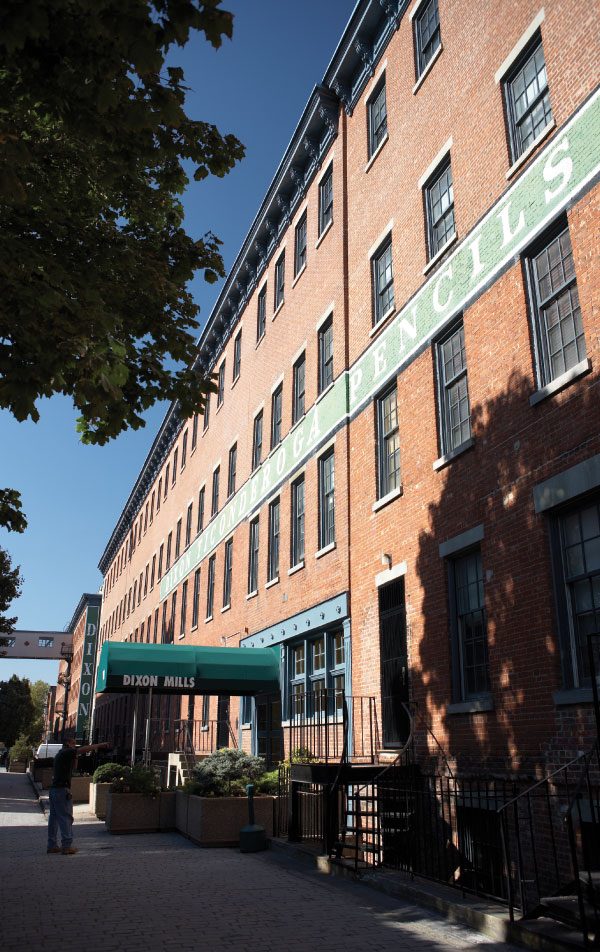
New Jersey has long had more than its share of industrial eyesores, from bleak factories to sprawling warehouses.
These days, those gritty, lifeless structures are giving way to hip and happening residential complexes. The trend started a few years back in Camden, Newark, and Hoboken, and now is leaving its mark on Jersey City and Trenton.
Developers say adaptive reuses of industrial buildings—or simply, conversions—are attractive for several reasons. One is affordability. “Where else can you get something nice for $200,000?” asks Michael Goldstein, a principal in HHG Development Associates in Trenton, whose successful conversions include the Cracker Factory in Trenton. “The price point here is similar to what you can purchase in a twenty-year-old ‘purpose-built’ plain vanilla condominium.” Which leads to another reason: “What we’re selling are breathtakingly beautiful, architecturally interesting apartments in a real community,” Goldstein says. “These are incredible design-forward spaces.”
Architect John Hatch, of the Trenton firm Clarke Caton Hintz, echoes this sentiment. “There’s a great stock of interesting but run-down and empty buildings in every city in the state,” says Hatch, who teamed with Goldstein, along with third partner David Henderson, to ride the urban reuse wave in Trenton. “There’s a renewed interest among home buyers for a denser urban center,” he says. “The people who are buying are sometimes first-home buyers, but certainly not always. The common thread is that they’re people who are looking for an interesting space at a good price in a walkable community.”
On these pages we look at three standouts among the many noteworthy conversions.
***********************
Dixon Mills, Jersey City
Perhaps the most residential-looking of the state’s industrial conversions, this former factory consists of five meandering, interlocking buildings with multiple courtyards and a cobblestone street running down the middle. Originally built in 1847, Dixon Mills manufactured a variety of products, including the ubiquitous yellow No. 2 pencil.
Manufacturing ended long ago, and the original conversion to rental apartments took place in the 1980s. The new developer—the Robert Martin Company of Westchester, New York—is currently completing the conversion to condominiums, and has restored many of the original architectural details of the Romanesque-Revival-style buildings. Units have period brickwork, wrought-iron railings, high ceilings, and large windows; no two layouts are the same. Prices range from $250,00 to $750,000.
Located near restaurants and boutique shopping, Dixon Mills is attracting an eclectic mix of residents. Juan and Jaime Gali moved to Dixon Mills in February 2008 while expecting their first child. They had burned out on the hustle and expense of city life but wanted to keep their jobs in Manhattan. It was the diversity of the residents, says Juan, that first drew them to Dixon Mills, followed by price and location. They immediately fit in. “There are a lot of young families here, a lot of people just having kids,” he says. “We met people immediately, more than we ever did living anywhere else.”
************************
Canco Lofts, Jersey City
Conversion is almost complete at the former American Can Company factory, once the world’s largest producer of metal cans, including the first beer can. Here, loft spaces have panoramic windows and original slab ceilings—often with exposed pipes and structural holes where assembly-line equipment was hung. Some ceilings are as high as 14 feet.
Manhattan-based developer Coalco calls the undertaking an “innovative rehabilitation project.” It includes 500 units ranging from 648 square feet to 1,663 square feet, with prices running from about $350,000 to $850,000. According to Marco Tartaglia, sales and marketing manager of the building, more than 45 percent of the converted units sold immediately upon offering.
Canco Lofts is the first revitalized industrial site on Jersey City’s long-neglected West Side. The project will eventually feature a ground floor of retail shops. Planned amenities within the building include a 10,000-square-foot residents club with a fitness facility, game room, screening room, outdoor bamboo garden, and children’s play room. More than two-thirds of the new residents are under 40, reports Tartaglia. There are couples in the mix, but the majority are single.
*************************
The Cracker Factory, Trenton
Almost ready for tenants, this South Trenton project is part of an overhaul of the gritty Ferry Historic District, dubbed Trenton Ferry. The Cracker Factory—birthplace of the oyster cracker—was built in 1847. It has undergone an extensive restoration to return it to its glory as a stately building with beautiful wood detailing and multicolored brick corbeling.
Of the eighteen units, fourteen are spoken for. Prices start at $129,000; $281,250 buys a two-bedroom, three-bath unit with a balcony, 12-foot ceilings, and seven enormous windows in the living/dining area. In converting the site, HHG Development placed a premium on energy efficiency and sustainable-design features, reusing whatever materials they could salvage.
***************************



